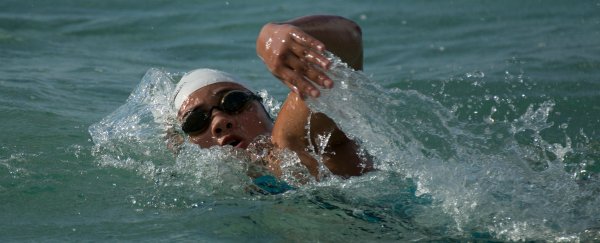Just in time for summer, scientists have announced that there are traces of antibiotic-resistant Escherichia coli in the UK's coastal water, and they pose "a potential risk of exposure" to swimmers.
Don't panic just yet - the bacteria strain only made up 0.12 percent of the water sampled, and there's no evidence of it causing infections in humans. But the new research shows that swimmers and surfers could potentially be exposed to the bug because of how much seawater they swallow.
E. coli can cause severe food poisoning, and the strain this study was looking at is resistant to third-generation cephalosporin antibiotics, or 3GCs, which makes it harder for doctors to treat.
To work out whether bathers were at risk of being exposed to this nasty bug, the researchers first analysed the amount of antibiotic-resistant E. coli found in the coastal waters of England and Wales, based on samples taken in 2012. They then studied how much water is swallowed, on average, by swimmers, surfers, kayakers and other water sports participants, and used this to calculate their risk of exposure.
Publishing their results in Environment International, the researchers predict that more than 6.3 million water-sport sessions in 2012 would have resulted in people swallowing at least one antibiotic-resistant E. coli bug. However, there's no evidence to suggest that the exposure would make people sick.
"We know very little about how the natural environment can spread antibiotic resistant bacteria to humans, or how our exposure to these microbes can affect health," lead researcher William Gaze, from the University of Exeter in the UK, said in a press release. "People are exposed to antibiotic resistant bacteria in many ways, through person to person contact, via food and as a result of international travel. Our research establishes recreational use of coastal waters as an additional route of exposure."
The research also suggests that the exposure risk could be underestimated, as it's closely linked to how contaminated a particular beach or coastal waterway is.
"With millions of people visiting beaches in England and Wales each year, there is a risk of people ingesting 3GC resistant E. coli, and it looks like water-users' exposure to all resistant bacteria could be even higher," Gaze added.
However, the researchers stress that they haven't yet shown whether that presents a health risk or not - the next step is to find out exactly what happens to that antibiotic-resistant E. coli once inside the human body.
"We're not recommending that people stop visiting the beach," said team member Anne Leonard. "This kind of research will help us ensure people can still make the most our coastal resources."
